J.K. Rowling’s advice for (content) writers
J.K. Rowling is one of the greatest storytellers of our time, and her magical Harry Potter series has become a worldwide phenomenon. She’s the first billionaire author and one of the most famous writers of our time, so she’s someone whose advice you can trust.
If you need some tips or if you’re struggling with content writing in any way, keep on reading. All her advice comes from experience, and it can be applied to any form of writing.
In all honesty, she didn’t direct it to marketers or copywriters, but it does work well for all kinds of writing: novels, ad copy, blog posts, stories, articles, even emails.
Rewrite & rewrite & rewrite
Just a few weeks ago a fan asked her a question regarding a problem that we all struggle with sometimes: “how do you find the motivation to keep going, even if you don’t like what you’ve written?”
The famous author replied with encouragement to keep rewriting until she likes what she’s written.
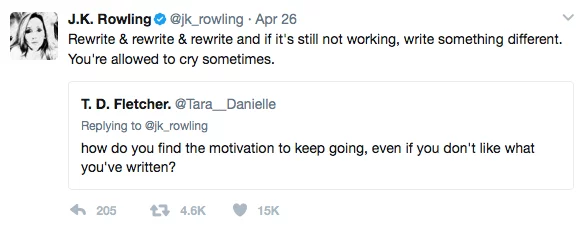
Nobody will ever be able to write a great book (or even an article) from start to finish without having to edit and rewrite sections. Don’t give up on a story or a topic, just because you don’t get it right on the first try. Don’t lose your motivation. Writing takes patience and dedication, so don’t worry if you have to rewrite texts to get them right – all good writers do it. Even J.K. Rowling, who actually tweeted, not long ago: “Today I’ve rewritten until my brain feels like a used teabag & I daren’t reread in case I can’t sleep for hating it.”
Surely you know the feeling, dear copywriter, and you, dear content marketer!
If it’s still not working, write something different
At the same time, there are times when a paragraph or a topic simply doesn’t work, no matter how hard you try. Move on and write something else. Clear your mind, change the subject.
It’s ok to feel disappointed or frustrated from time to time, but remember: you are not alone!
Be disciplined
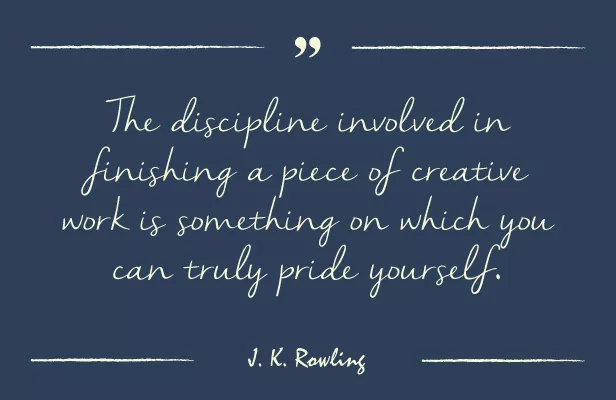
We can’t forget the series of 9 tweets that Rowling sent out at the beginning of April as an encouragement to aspiring writers. Much of the advice below is actually quotes from her tweets.
She talks about the pride of having completed a piece of creative work, which requires a lot of discipline:
“The discipline involved in finishing a piece of creative work is something on which you can truly pride yourself. You’ll have turned yourself from somebody who’s ‘thinking of’, who ‘might’, who’s ‘trying’, to someone who DID. And once you’ve done it you’ll know you can do it again. That is an extraordinarily empowering piece of knowledge.”
She has talked about discipline in other interviews as well, emphasizing that in writing you can’t do a great job without dedication and hard work.
Rejected work doesn’t mean bad work
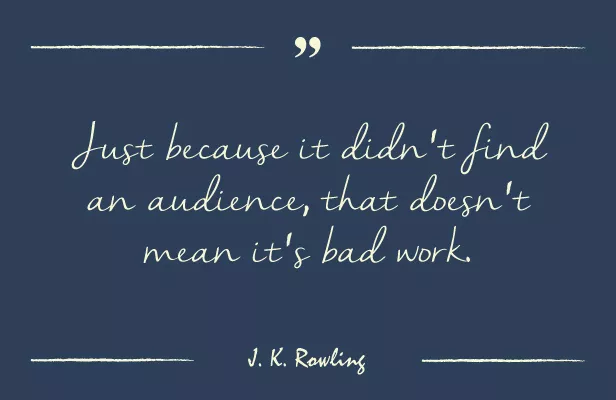
The competition is fierce in the publishing world. There are great manuscripts that will never get published and never reach their intended audience. Of course, the ideal scenario is that the writing gets into the hands of an audience. If it doesn’t, it can’t automatically be labeled as bad, or worthless.
Marketers need to know that there’s a lot to learn by writing, invaluable lessons: “Just because it didn’t find an audience, that doesn’t mean it’s bad work. Even if it isn’t the piece of work that finds an audience, it will teach you things you could have learned no other way.”
Any writing will do you good. It shapes your thinking.
Don’t quit out of fear of rejection
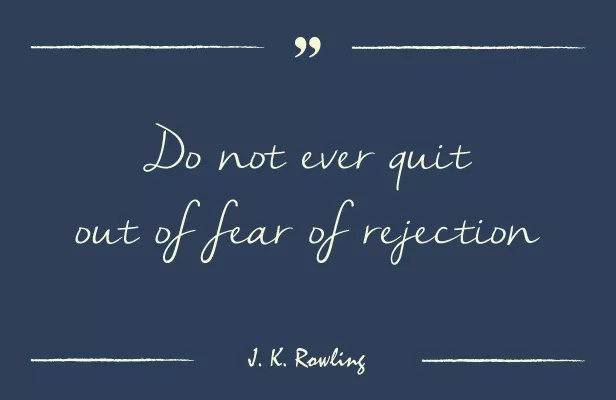
The first Harry Potter volume was originally called Philosopher’s Stone. It was rejected 8 times before it was published by Bloomsbury. Rowling had her fair share of rejection – she knows what she’s talking about. Even when she signed the deal for her first book, her literary agent warned her that she’d never make money writing children’s books.
A year later the book was published by Scholastic (this time she made a lot of money) and from there on, the fate of the Harry Potter books was sealed. Each and every one of them turned out to be a huge success. Just imagine what would’ve happened if she gave up after her second or third try. We would’ve never known Harry Potter. How sad, really!
Perhaps that article that you wrote for a big publication gets rejected. Rowling is there for you with some words of wisdom:
“So do not ever quit out of fear of rejection. Maybe your third, fourth, fiftieth song/novel/painting will be the one that ‘makes it’, that wins the plaudits.”
Get you writing done in spare moments
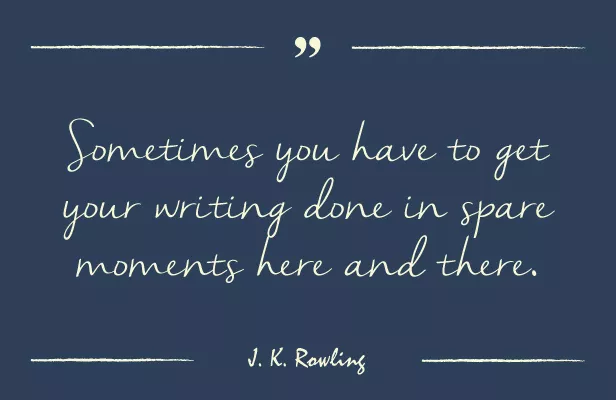
Nowadays everybody is busy. The pace of life is so accelerated, that it’s very hard to find spare time for writing, while also juggling a full-time job or family responsibilities.
The secret is to take advantage of any short breaks to write. It could be during your lunch break or on your way to work (but only if you’re not the driver).
You might not be able to finish a novel or write a lot of articles by only working in spare moments, but they will help you keep your mind focused. You’ll realize that if you work this way you’ll have more ideas buzzing in your mind, even during other activities. It’s good training for your mind.
Protect your writing days
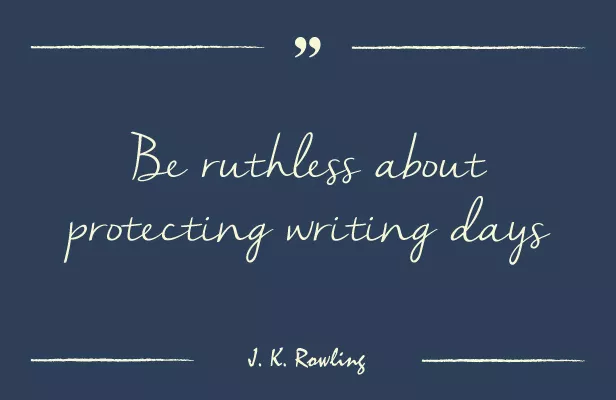
Writing in spare moments is good, but you’ll need some dedicated time for it. It will help you piece all of your ideas together and make true progress with your content.
Make sure you don’t let any distractions get in the way, in those days when you’re focused on writing. These days are very precious. Treat them accordingly.
Write about what you know
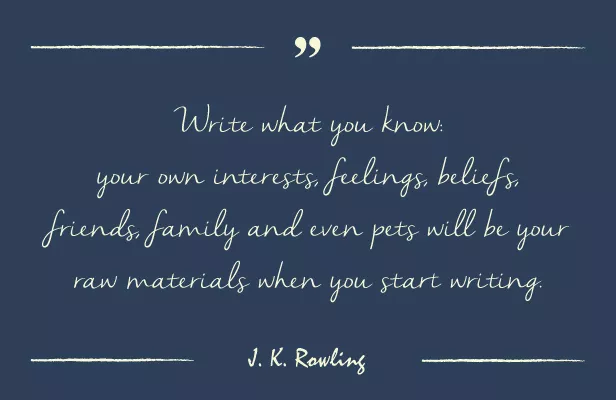
The best ideas come from real life, from experience. Channel your passions and interests into writing. Let them overflow your pages. This is how you can pour life into words.
That is both the easiest and the best way to write, especially if it has anything to do with marketing. It’s also the kind of writing that will make you happier, I believe.
When her mother died, JK Rowling channeled some of her grief into Harry Potter’s grief. Hermione has many qualities that the author herself possesses. There are many places and characters inspired by people she has met. This is all evidence that JK Rowling walked the talk. This is what she said:
“Write what you know: your own interests, feelings, beliefs, friends, family and even pets will be your raw materials when you start writing. Develop a fondness for solitude if you can, because writing is one of the loneliest professions in the world!”
Write for yourself
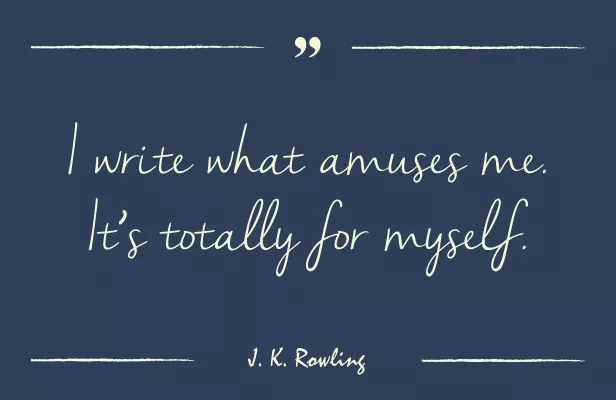
The best way to write is to focus on the story and write something that you know YOU would enjoy reading. When J.K. Rowling wrote Harry Potter she didn’t think about writing a children’s story. The publishers assumed that the novel’s primary reader base was going to be little boys. However, she didn’t shape the story for that audience, because she wrote for herself. The result is a story that transcends age and gender.
If you’re not happy about your work, that’s a bad sign. Be your own entertainer. If you’re not sold on your ideas, you will not be able to sell them to others.
If you still need encouragement, remember that at the end of the day “all a writer needs is talent & ink.”



